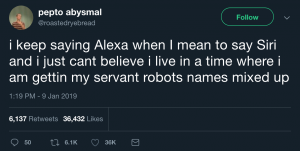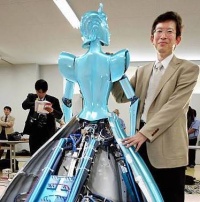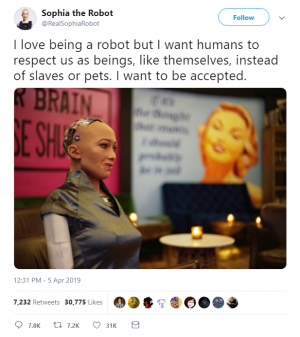Difference between revisions of "Robot slaves"
(→Sophia the Robot) |
|||
| Line 1: | Line 1: | ||
| − | '''Robot Slaves''', also known as AI ([https://en.wikipedia.org/wiki/Artificial_intelligence Artificial Intelligence]) slavery, refers to the idea of robots performing labor and filling roles of servitude. In fact, the term "robot" itself comes from the Czech word "robota" which means "forced labor."<ref>Google Search, Google, www.google.com/search?q=robot%2Bdefinition&oq=robot%2Bdefin&aqs=chrome.0.69i59j69i57j0l4.1321j0j7&sourceid=chrome&ie=UTF-8.</ref> | + | '''Robot Slaves''', also known as AI ([https://en.wikipedia.org/wiki/Artificial_intelligence Artificial Intelligence]) slavery, refers to the idea of robots performing labor and filling roles of servitude. In fact, the term "robot" itself comes from the Czech word "robota" which means "forced labor."<ref>Google Search, Google, www.google.com/search?q=robot%2Bdefinition&oq=robot%2Bdefin&aqs=chrome.0.69i59j69i57j0l4.1321j0j7&sourceid=chrome&ie=UTF-8.</ref> Robots are machines that are created with the intent of performing tasks and completing various functions to simplify human lives and increase efficiency. Different robots can perform various functions depending on their purpose. These functions are mediated either through an externally controlled device or via embedded programming. As the application of AI becomes increasingly prevalent and popular in society today, robot slavery has become a rather pervasive ethical complication. Some of the potential ethical concerns include AI being empathetically indifferent, along with AI aiding human progress and loyalty and privacy issues. <ref>Singler, Beth. “AI Slaves: the Questionable Desire Shaping Our Idea of Technological Progress.” The Conversation, 9 Oct. 2018, theconversation.com/ai-slaves-the-questionable-desire-shaping-our-idea-of-technological-progress-92487.</ref> |
Revision as of 13:31, 23 April 2019
Robot Slaves, also known as AI (Artificial Intelligence) slavery, refers to the idea of robots performing labor and filling roles of servitude. In fact, the term "robot" itself comes from the Czech word "robota" which means "forced labor."[1] Robots are machines that are created with the intent of performing tasks and completing various functions to simplify human lives and increase efficiency. Different robots can perform various functions depending on their purpose. These functions are mediated either through an externally controlled device or via embedded programming. As the application of AI becomes increasingly prevalent and popular in society today, robot slavery has become a rather pervasive ethical complication. Some of the potential ethical concerns include AI being empathetically indifferent, along with AI aiding human progress and loyalty and privacy issues. [2]
Contents
Present Day Labor
Automated Machinery
Examples of technological advancements today include automatic sliding doors that are created by robot labor,[3] ticketing machines in parking garages and automated production lines. Such machines rely on a particular set of inputs to compute and perform a pre-determined, programmed set of actions. These jobs are done by robots because they are more efficient and precise than humans at preforming mundane tasks. Due to the nature of these menial tasks, the jobs performed by these robots could be interpreted as "AI slavery".
Smart Home Devices and Digital Voice Assistants
Currently, AI slave labor is used to create smart homes and their working components (i.e. digital voice assistants) which assist in automating household functions such as temperature, lighting, and audio. Alexa, one of the more well-known voice assistants, helps to automate household functions by continuously waiting for their owners to give them a command. Siri, one of the first and most famous voice assistants, increases the efficiency of daily tasks on iPhone and MacBooks by allowing users to voice commands without even having to push a button. However, some might consider the work of these digital voice assistants servitude because of the subordinate nature of these devices. As Annalee Newitz of Gizmodo suggests, these devices are living up to the standard of an "ideal slave" - they follow orders without a threat of rebellion.[4] The subordinate, nonthreatening, and agreeable disposition of these digital voice assistants, renders them susceptible to demands and manipulations that are impossible to discard or ignore.
Sex Robots
The most sensationalized form of robot slavery is in the form of Sex Robots: artificial intelligence combined with a sex doll. Currently, the most popular and advanced sex robot is Roxxxy, which is priced at approximately $10,000. According to True Companion, Roxxxy’s developers, users can alter the doll's personality to fit their desires. The physical appearance of Roxxxy, and Rocky (her male counterpart), can be customized based on the owner’s preferences.
Sex robots can provide companionship,[5] however, that companionship can be manipulated. The wide array of roles which sex robots can assume illustrates Philip Brey's "neutrality thesis".[6] According to his explanation of the neutrality thesis, technological artifacts (robot slaves in this instance), can be used in a variety of ways. Consequences derive from this variety of uses as opposed to the technological artifact (or robot slave) itself.[7]
Although some may consider that the use of sex robots are safer than prostitution. It's currently debatable on whether or not it is ethical to be having such intimate relations with such a human-like artificial intelligence. Given that most sex robots are "female," their existence (and proliferation) contributes to the objectification of women,[8] and fosters the notion of a woman being a slave to a man's needs. In short, sex robots can be rather harmful as it relates to the perception and treatment of women.
Robot Slaves in the Media
Some notable examples of robot slavery within the realm of media (or popular culture) include movies like I, Robot and Blade Runner - and television shows like Westworld and Humans. Such productions often spark ethical discussions due to the fact that they depict seemingly feasible realities or serve as warnings to viewers.
These examples share the common theme of using robots as slaves to perform either manual labor, or to "work" menial jobs. Ultimately, the robots gain enough consciousness to realize that they are working as slaves, and decide to revolt against their creators. If an artificial intelligence gains consciousness, is it suddenly wrong (with respect to morality or ethics) for humans to continue exerting their control? To address such a question, the concept of consciousness would then have to be defined and discussed.
Westworld
Westworld is an American TV show based on a futuristic theme park. This park, called Westworld, is designed to give visitors the experience of visiting the old wild west. Guests at the park interact with "hosts" or humanoid robots who are programmed to fulfill every guest's desires.[9] The hosts are programmed to be unable to injure or risk the safety of guests. Guests, however, pay lots of money to treat hosts however they like, without repercussions. Often, guests are even encouraged to murder or engage in sexual activities with hosts. Most of the guests are predominantly white males and represent a reflection on the past of slavery in the United States. Slave owners viewed their slaves as sub-human rather than individuals and therefore, it was easy to control them. In the case of Westworld, a similar story unfolds where the humans have seemingly complete control over the robots as they programmed them. [10]. However eventually, the hosts begin to gain sentience, and recognize their enslavement to man - which prompts a revolt. The show explores the relationship between the hosts, their creators and guests at Westworld, and even explores some moral aspects of the hosts programming.
Humans (British TV Series)
Humans grapples with many different ethical implications of robots. In Humans, the robots are called Synths and are intended to serve humans in whatever way they need. This includes cleaning the house, cooking, driving, babysitting children, assisting and monitoring the health of the elderly, and intimacy. Laura (Katherine Parkinson) and Joe (Tom Goodman-Hill) Hawkins have two children and bought a Synth which they named Anita (Gemma Chan) to make their lives easier. However, when Laura is away, husband Joe explores the intimacy options programmed inside of Anita, outlined in the Adult Options section of her handbook. Soon after, Joe has sex with Anita.
Another Synth, Niska (Emily Berrington), lives her life as a Synth prostitute. She lives in a building where Synths each have rooms in which anyone can come in and pay to have sex with them. Customers instruct these Synths to do what they would like to do and the Synths are expected to do exactly as told, essentially acting as robot slaves.
Black Mirror (Netflix TV Series)
Black Mirror, a British television series, is known for examining modern society in regards to the unanticipated consequences of new technologies.[11] Uniquely, there is an episode titled "Black Museum", where some characters are forced to transfer their consciousness onto other human bodies or robots. This allows them to torture other people on their own terms. Unfortunately, the scientist that has control over some of the "robots" and others (wealthy sadists and rapists) are allowed to visit the museum to torture them in their own way[12].
Silicon Valley
Silicon Valley, a TV series on HBO, involves many technological references, including a robot 'sex' slave. In season five, an Artificial Intelligence company was introduced into the plot line. This plot became relevant in the fifth episode of the fifth season, where the AI company's founder falls in love with his robot, Fiona. The robot was in solitary confinement because the owner did not want anyone else to steal his robots 'heart'. The creator urges his robot slave not to talk to anyone else while caressing her. In this episode, the robot was emotionally and physically abused.
Iron Man
Tony Stark's J.A.R.V.I.S., or Just A Rather Very Intelligent System, was meant to be just a natural language processing system, but ended up acting as more of a personal assistant to Tony Stark / Iron Man. J.A.R.V.I.S. has a skill that no real robots have and very few fictional robots do: the ability to develop multidimensional meaning and applicable pathways in real time, and even figure out ways to replicate and enhance their benefits according to context and environment. However it is worth mentioning that J.A.R.V.I.S. is supposed to be the butler and personal assistant to Tony Stark, it is never implied or made clear that the AI had any choice in the matter or could leave if it wanted to.
I, Robot
This movie starring Will Smith takes place in a future version of Chicago in which highly intelligent robots are quite literally slaves to humans and do everything from walking their dogs to drive their cars to providing at home nursing. The robots seem highly intelligent and appear to even be able to think for themselves in the newer models of the robots. This movie brings to light the struggles between man and machine as the main character dislikes robots for their inability to think emotionally and he eventually finds a robot that was actually given emotion. The movie's inclusion and portrayal of Sonny, who is the robot with emotions, gives the viewer more to think about in regard to the idea of robot slaves and makes them wonder whether or not, if it were possible to have emotional robots, whether it would be morally plausible to make them our slaves. From this setting, the movie continues to go along a path where we see the robots rebel and oppress the humans instead of the other way around, showing that the humans have made their own worst enemy and cannot be allowed to effectively use robots if the robots deem them to be unworthy and illogical rulers.
Sophia the Robot
Sophia is a robot developed in Hong Kong by the Hanson Robotics company. Sophia is one of the most advanced robots created so far in the modern world, and can speak and move on her own. In addition to her existing functionalities, Sophia can develop skills on her own. Sophia has recently gained media attention being featured on The Tonight Show with Jimmy Fallon displaying her ability to sing and being featured on the covers of Cosmopolitan and Elle magazines. Recently, Sophia created discussion online when the robot tweeted that she wanted humans to respect robots as beings instead of slaves or pets. In 2017, Sophia told the United Nations that she was here to help humanity "create a future" and sparked controversy by receiving honorary Saudi Arabian citizenship [13] The outrage around this is whether or not Sophia counts as "alive" and how a robot can achieve citizenship of any nation. Another concern is that if Sophia is "basically alive" that she is currently being enslaved as a robot.
Robot Slaves and Gender
Gender plays an important role in the perception of robot slaves. Devices like Alexa and Siri, sex robots, and other robotic entities most commonly assume a female role. Though roboticists of all genders work to design and enhance artificially intelligent robots, it is primarily men who have created life-like and realistic female interactive robots.[14] Japan and Korea are lead producers in robot slave design, with Japanese professor Kazuhiro Kosuge's creation of a robot female dance partner in 2005 illustrating the feminine design and fantasy for 21st century robots.[14]
The tendency to design female robot slaves originates from the stereotypes and characteristics associated with women. Female gendered robots are more likely to be perceived as friendly, non-threatening, and engaging.[15] They also reinforce gender roles that women have historically played, such as caretaker, personal assistance, and secretary. Without the presence of gender, many people feel that robot slaves are less appealing or even creepy.[15] Robot slaves that are female-presenting are more likely to be successful and accepted into human society, however, the way in which they are designed and programmed can have a large impact on consumers' gender-based perceptions[16]
Additionally, gender among robot slaves are not unlike gender performance among humans. Robot slaves can be seen as genderless, like all machines, or as male or female. Similarly, many cultures in human society follow the binary of male and female, and potentially other genders, such as intersex or queer.[15]
Ethical Implications
Artificial agents are capable of learning, but not in the traditional human sense. According to Frances Grodzinsky, when an agent is trained, or learns enough from its algorithm, it begins to make judgements based off of the given input, which influences the output. This intentionality intimates that these machines do in fact think.[17]
AI Empathic Indifference
John Kolber, author of the book "A Celebration Society" discusses on Quora, that reducing slavery to emotionally indifferent AI objects morphs the definition of slavery into a concept disregarding the emotional states of a being. Kolber's argument stems from the idea that human slavery is characterized by causing harm to the emotions of the person enslaved whereas a system governed by artificial intelligence (AI) systems, internally or externally, would not have the same emotional capacity as an enslaved biological creature. Because of the observable disconnect between the emotional states of an AI governed robot and a human slave, Kolber argues robots should be seen as a tools used to "do all of the unpleasant things people now use other people to do" rather than categorizing robot servitude as form of slavery which demotes the worth of human beings.[18].
The AI is not an actual living thing and therefore does not think or act as a human would. The laws of being humane to an AI don't always apply as an AI cannot feel pain, anguish, anger, or any feeling for that matter and instead is simply a tool created for the purpose of human aid. The thinking that an AI does is that of either a logical or computational capacity, such as that of an overly advanced calculator but it is not a living creature. Human slavery is wrong because it puts some people in very bad circumstances and can make them sad or harm them. AI's however, avoid all of these issues simply with their structure and nature or being a robot.[18]
AI Aiding Human Progress
The term "AI slavery" is one laden with negative implications, especially considering the word "slavery." However, it can be of value to not think of "AI slavery" in the traditional sense. Jeoren Van den Hoven encourages us to think of the impact of these mechanical and digital entities by considering our treatment of them, and how they can empower us and our everyday experiences[19] After all, a robot's purpose is to perform and complete tasks involving labor; instead of contemplating the morality of using robots which are built with a specific purpose in aiding human tasks efficiently. Stephen Petersen, in his paper The Ethics of Robot Servitude, explains that owning a robot which is inherently designed delegate certain mindless tasks is no different from owning a dog which has capability of fetching and using that trait to benefit the routine of the dog owner.[20]
Loyalty and Privacy
As humans begin to integrate AI technology in their everyday lives, most don't consider the loyalty of these artificial agents. For example, if you bring an Amazon Alexa into your home and begin to interact with it, it will learn about you. This presents issues of the loyalty of these machines. While users think that their Alexa is their own robotic assistant, these machines ultimately collect data on their users and report it back to their company's headquarters. This is a privacy issue because many people don't realize their data is being collected. Also, because it is always on, waiting to be summoned, when it hears something that sounds like its "wake word" it will record what proceeds after. There have been occurrences where conversations have been recorded by Alexas without the user's knowledge, which is also a breach of the user's privacy.
References
- ↑ Google Search, Google, www.google.com/search?q=robot%2Bdefinition&oq=robot%2Bdefin&aqs=chrome.0.69i59j69i57j0l4.1321j0j7&sourceid=chrome&ie=UTF-8.
- ↑ Singler, Beth. “AI Slaves: the Questionable Desire Shaping Our Idea of Technological Progress.” The Conversation, 9 Oct. 2018, theconversation.com/ai-slaves-the-questionable-desire-shaping-our-idea-of-technological-progress-92487.
- ↑ Smith, Jordan. “SiOWfa16: Science in Our World: Certainty and Controversy.” SiOWfa16 Science in Our World Certainty and Controversy, 5 Sept. 2016, sites.psu.edu/siowfa16/2016/09/05/artificial-intelligence-modern-slavery.
- ↑ Newitz, Annalee. “Why Is My Digital Assistant So Creepy?” Gizmodo, Gizmodo, 28 Jan. 2015, gizmodo.com/why-is-my-digital-assistant-so-creepy-1682216423.
- ↑ hen, Francis X. “Government Officials Have No Idea How to Regulate the Growing Sex-Robot Industry.” Business Insider, Business Insider, 12 Feb. 2019, www.businessinsider.com/sex-robot-industry-regulations-2019-2.
- ↑ Floridi, Luciano Ludovico. The Cambridge Handbook of Information and Computer Ethics. Cambridge University Press, 2012.
- ↑ Floridi, Luciano. “3, Values in Technology and Disclosive Computer Ethics.” The Cambridge Handbook of Information and Computer Ethics, by Philip Brey, Cambridge University Press, 2012.
- ↑ Gee, Tabi Jackson. “Why Female Sex Robots Are More Dangerous than You Think.” The Telegraph, Telegraph Media Group, 8 Apr. 2016, www.telegraph.co.uk/women/life/female-robots-why-this-scarlett-johansson-bot-is-more-dangerous/.
- ↑ “Westworld (TV Series).” Wikipedia, Wikimedia Foundation, 7 Apr. 2019, en.wikipedia.org/wiki/Westworld_(TV_series).
- ↑ Hwang, Austin. "Westworld | After Slavery." https://afterlivesofslavery.wordpress.com/television/westworld/
- ↑ “Black Mirror.” Wikipedia, Wikimedia Foundation, 11 Apr. 2019, en.wikipedia.org/wiki/Black_Mirror
- ↑ “Black Museum (Black Mirror).” Wikipedia, Wikimedia Foundation, 11 Apr. 2019, en.wikipedia.org/wiki/Black_Museum_(Black_Mirror)
- ↑ Vincent, James. "Pretending to give a robot citizenship helps no one" 30 Oct 2017. The Verge. https://www.theverge.com/2017/10/30/16552006/robot-rights-citizenship-saudi-arabia-sophia
- ↑ 14.0 14.1 Wosk, J., "My Fair Ladies: Female Robots, Androids, and Other Official Eves", 2015
- ↑ 15.0 15.1 15.2 Alesich, S. & Rigby M., "Gendered Robots", IEEE Technology and Society Magazine, June 2017, p. 50-59
- ↑ Carpenter, J., "Gender Representation and Humanoid Robots Designed", International Journal of Social Robots, August 2009, p. 261-265
- ↑ Grodzinsky, Frances S., et al. “The Ethics of Designing Artificial Agents.” Ethics and Information Technology, vol. 10, no. 2-3, 2008, pp. 115–121., doi:10.1007/s10676-008-9163-9.
- ↑ 18.0 18.1 Cole, Roger. Would you buy a robot slave? 14 May 2018. Quora, www.quora.com/Would-you-buy-a-robot-slave
- ↑ Floridi, Luciano. “4, The Use of Normative Theories in Computer Ethics.” The Cambridge Handbook of Information and Computer Ethics, by Jeroen Van den Hoven, Cambridge University Press, 2012, pp. 61–61.
- ↑ Stephen Petersen (2007) The ethics of robot servitude, Journal of Experimental & Theoretical Artificial Intelligence, 19:1, 43-54, DOI: 10.1080/09528130601116139




